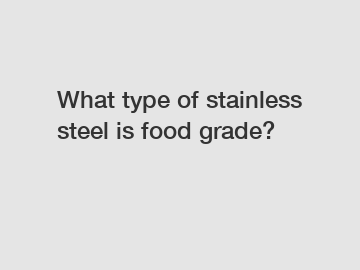What Type of Stainless Steel is Food Grade?
If you have ever wondered why stainless steel is the primary material for kitchen appliances and cookware, you are not alone. Stainless steel offers a unique combination of durability, corrosion resistance, and ease of cleaning, making it ideal for applications in the food industry. However, not all stainless steel is created equal when it comes to food-grade standards. In this blog post, we will explore the different types of stainless steel and identify the ones that are safe for food contact.
Before diving into the specifics, it's essential to understand what defines stainless steel. Simply put, stainless steel is an alloy composed mainly of iron, with at least 10.5% chromium content by mass. The chromium in stainless steel forms a thin, invisible layer of chromium oxide on the surface, referred to as the passive layer. This layer is responsible for stainless steel's exceptional resistance to corrosion.

Now, let's move on to the different grades of stainless steel and determine which are food safe.
1. Austenitic Stainless Steel:
Austenitic stainless steel is the most common type of stainless steel used in food processing and preparation. It is highly corrosion-resistant, non-magnetic, and possesses excellent formability. The most popular grade within this category is the 304 stainless steel, also known as 18/8 stainless steel. With 18% chromium and 8% nickel, it exhibits excellent resistance to rust and oxidation. This grade is often used for kitchen appliances, kitchen sinks, and food processing equipment.
2. Ferritic Stainless Steel:
Ferritic stainless steel is another type commonly used in food-grade applications. It contains higher amounts of chromium and low amounts of carbon, making it resistant to corrosion and oxidation. The most common grade in this category is the 430 stainless steel, which is often seen in kitchen utensils, countertops, and equipment panels. While it offers good corrosion resistance, it is less resistant than austenitic stainless steel.
3. Martensitic Stainless Steel:
Martensitic stainless steel is known for its high strength and hardness. However, it is not as resistant to corrosion as austenitic or ferritic stainless steel grades. This type of stainless steel is primarily used in cutlery, such as knives and blades, but it is generally not recommended for direct food contact due to potential leaching of metals.
4. Duplex Stainless Steel:
Duplex stainless steel combines the properties of austenitic and ferritic stainless steel, offering a higher resistance to corrosion than the individual types. Due to its enhanced toughness and durability, it is commonly used in industrial food processing equipment, such as tanks, pipelines, and mixing vessels. However, it is worth noting that duplex stainless steel may not be as readily available as other grades.
When it comes to ensuring that the stainless steel used in food contact is food grade, it's crucial to consider additional factors beyond the grade itself. The manufacturing process, surface finish, and cleanliness all play a significant role in determining whether the stainless steel meets food-grade requirements. It is essential to work with reputable manufacturers and suppliers who value hygiene and adhere to strict quality standards.
In conclusion, austenitic stainless steel, particularly the 304 grade, is the most common type used for food-grade applications. It provides excellent corrosion resistance and is widely available in various forms. Ferritic stainless steel, like the 430 grade, is another suitable option, but it offers slightly less corrosion resistance than austenitic stainless steel. Martensitic stainless steel is generally not recommended for direct food contact, while duplex stainless steel is primarily used in industrial food processing.
As always, it is crucial to consult with professionals or experts in the field to ensure compliance with specific food-grade regulations and standards. By choosing the appropriate stainless steel grade and working with reputable suppliers, you can enjoy the benefits of a safe and hygienic environment in your kitchen or food processing facility.
For more 3 Way Ball Valve Supplier, Stainless Steel Valve Body, Three Way Ball Valve Chinainformation, please contact us. We will provide professional answers.



Comments
Please Join Us to post.
0